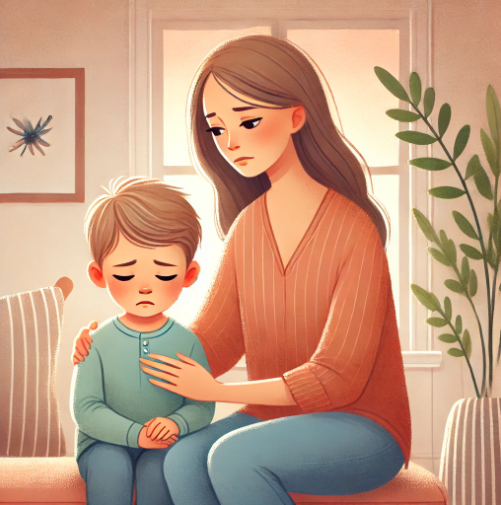- Mar 28, 2025
Why Your Child Feels Like You’re Not Listening — And How to Fix It Before It Hurts Your Relationship
- Sabrina Ragan
- Navigating Parenting Challenges
- 0 comments

“I was listening… or at least I thought I was.”
How many of us have found ourselves here? You’re with your child—maybe making dinner, scrolling your phone, or caught in the mental whirlwind of your to-do list—when suddenly, they’re upset. They storm off, mutter “You never listen,” or melt down in frustration.
And you’re left wondering:
“Wait... what just happened?”
You thought you were present. You weren’t trying to dismiss them. But something was missed—and now the connection feels fragile. If this sounds familiar, you’re not alone. And more importantly? You’re not failing.
💔 The Hidden Cost of Feeling Unheard
In the rush of everyday life, listening often becomes something we do on autopilot. But the truth is, real listening—the kind that makes our kids feel seen, safe, and emotionally secure—is a rare gift in today’s world.
When our children feel like we’re not listening (even when we think we are), it slowly chips away at:
Their willingness to open up
Their ability to regulate emotions
Their trust in us as a safe space
And over time, this can look like:
More meltdowns or outbursts
Withdrawing emotionally
Saying what they think we want to hear
Feeling like their feelings are “too much” or not valid
This isn’t about being a “bad mom.” It’s about being a human mom—in a loud, distracted world, doing the best she can. But there is a way to rebuild that bridge, and it starts with understanding what listening really means.

🧠 Why Listening Is Harder Than It Seems (And Why It Matters So Much)
Let’s talk science for a moment—because the problem isn’t you. It’s your brain.
We speak at about 125 words per minute.
We listen at about 400 words per minute.
We think at around 900 words per minute.
That means your brain is moving way ahead of your child’s words. And in that space, it’s easy to:
Start problem-solving before they’ve finished talking
Drift off to dinner plans or tomorrow’s schedule
React from your own stress, not their story
Miss the deeper meaning behind their words
Now imagine what’s happening in your child’s brain. They’re still learning how to name feelings, form sentences, and organize thoughts. They’re processing slower, while you’re operating faster. It’s like trying to sync two radios that are on different frequencies.
No wonder we miss each other.
🧭 The Listening Trap: What Moms Often Miss
Even the most loving moms fall into these common listening traps:
Jumping into “fix it” mode instead of letting them feel
Interrupting with reassurance (“You’re okay!”) instead of curiosity (“Tell me more”)
Filtering through our own lens, assuming we know what’s going on
Reacting from guilt, anxiety, or stress instead of grounded presence
Sound familiar? You’re not broken. But these patterns can break trust if they become the norm.
🌱 The Healing Power of True, Attuned Listening
Here’s the truth: Listening isn’t just a communication tool. It’s a relationship transformer.
When your child feels truly heard, they begin to believe:
“My feelings make sense.”
“I can come to Mom when things are hard.”
“I don’t have to shout or shut down to be understood.”
Listening with presence (not perfection!) builds the foundation for:
✅ Better emotional regulation
✅ Stronger parent-child trust
✅ Fewer power struggles
✅ A lasting bond that carries through adolescence and beyond
💡 So, What Does Real Listening Look Like?
You don’t need a degree in psychology or hours of free time to start listening better today. Here’s what intentional listening sounds and feels like:
✨ 1. Slow the Moment Down
Pause. Breathe. Get down on their level. Your body cues tell them: I’m here for you.
✨ 2. Validate First
Instead of correcting, try:
“That sounds really hard.”
“Wow, you’re feeling a lot right now.”
“I hear you. I’m here.”
✨ 3. Make Space for Silence
Don’t rush to respond. Let the quiet hold their words. Sometimes, the healing happens in the pause.
✨ 4. Listen with Your Whole Self
Use your eyes, your posture, your energy. This tells your child: You matter more than my phone. More than my next task.
✨ 5. Reflect Before You Respond
Try saying, “What I’m hearing is…” and let them correct you if needed. It teaches them their voice has power.
❤️ You Are Already Teaching Listening — Whether You Know It or Not
Here’s the part that hits home for many of us:
Your child learns how to listen by watching how you listen to them.
If we want kids who are emotionally attuned, respectful, and able to hold space for others, it starts with us. And the most powerful way to teach listening isn’t a lecture—it’s modeling it.
So instead of asking:
“Why aren’t my kids listening to me?”
Ask:
“Am I truly listening to them?”
👶 What Listening Looks Like With Younger Kids
Young children don’t always have the words—but they feel everything. Here's how to support their developing communication skills:
Say their name to get attention
Make eye contact and get on their level
Invite them to sit before sharing something important
Ask them to repeat back what they heard in simple terms
Praise even small efforts to listen (“You were so focused just now—thank you!”)
These small practices build powerful habits over time.

🌺 Gentle Mindset Shifts for the Guilt-Weary Mom
Let’s release some pressure, shall we?
You don’t need to be a perfect listener. You just need to keep trying.
💛 You’re not “failing” if you miss a moment—repair is always possible.
💛 Every time you choose connection over correction, you’re changing the pattern.
💛 Your presence matters more than your performance.
Let this truth settle into your bones:
You are not the reason your child struggles. You are the reason they feel safe enough to grow.
🎁 Feeling Stretched Thin? Here’s the Support You’ve Been Needing…
Let’s be real—when your child is in full meltdown mode, it's hard to remember anything, let alone how to "listen with presence."
You're trying to stay calm, stay connected, and not fall apart yourself… but in the middle of a screaming grocery store tantrum or a sibling war in the living room, it can feel impossible.
That’s exactly why I created this free resource for you:
👉 Parent’s Ultimate Survival Guide: 17 Life-Saving Strategies to Keep Your Cool During Your Kid’s Meltdown
This isn’t fluff. It’s a practical, brain-based checklist of calming, confidence-building tools you can use in the heat of the moment—so you don’t just react… you respond with clarity, grace, and connection.
💛 Inside, you’ll learn:
How to ground yourself when emotions run high
What to say (and what not to say) to de-escalate faster
Simple mindset shifts that stop the guilt spiral before it starts
Because listening starts with your presence—and this guide helps you protect it.
✨ Grab your free guide now and take the first step toward calmer, more connected parenting—especially when it matters most.
💬 Ready for Real Support, Not Just More Advice?
Inside The Empowered Mom’s Community, we do things differently.
This is a safe, judgment-free space where you’ll find:
✔ Weekly coaching + science-backed strategies
✔ A loving community of like-hearted moms
✔ Tools that actually work in real-life meltdowns
✔ Encouragement that feels like a warm hug on the hardest days
You don’t have to figure this out alone.
Let’s grow together—one grounded, grace-filled conversation at a time.
👉 Learn more and join us here → The Empowered Mom's Community
Final Words: They’re Not Asking for a Perfect Mom. Just a Present One.
You are already showing up in powerful ways—by reading this, by caring so deeply, and by choosing connection over chaos.
So today, pause. Look your child in the eye. Breathe. Listen.
You’ve got this. And I’ve got you—every step of the way. 💛
Loved this? Feel free to share it with other moms who might need it on Facebook, Twitter, or LinkedIn🤗
Sabrina Ragan is a child psychologist, registered play therapist, and mom of three who helps overwhelmed moms raise emotionally secure, resilient kids using brain-based, attachment-focused strategies. She’s the creator of The Parent’s Connection—a supportive space for moms who want to parent with more confidence, calm, and connection. 💛
Free E-Book
Parent's Ultimate Survival Guide: 17 Life-Saving Strategies to Keep Your Cool During Your Kid’s Meltdown
Stop feeling overwhelmed by meltdowns.
This free guide offers brain-based strategies and practical tips to stay grounded, respond confidently, and build a stronger connection with your child, no matter how intense the moment gets.